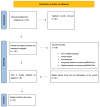Identification of Genetic Causes in Mayer-Rokitansky-Küster-Hauser (MRKH) Syndrome: A Systematic Review of the Literature
- PMID: 35883945
- PMCID: PMC9322756
- DOI: 10.3390/children9070961
Identification of Genetic Causes in Mayer-Rokitansky-Küster-Hauser (MRKH) Syndrome: A Systematic Review of the Literature
Abstract
Mayer-Rokitansky-Küster-Hauser (MRKH) syndrome is a congenital condition characterizing females with absence of the uterus and part of the vagina. Several genetic defects have been correlated with the presence of MRKH; however, the exact etiology is still unknown due to the complexity of the genetic pathways implicated during the embryogenetic development of the Müllerian ducts. A systematic review (SR) of the literature was conducted to investigate the genetic causes associated with MRKH syndrome and Congenital Uterine Anomalies (CUAs). This study aimed to identify the most affected chromosomal areas and genes along with their associated clinical features in order to aid clinicians in distinguishing and identifying the possible genetic cause in each patient offering better genetic counseling. We identified 76 studies describing multiple genetic defects potentially contributing to the pathogenetic mechanism of MRKH syndrome. The most reported chromosomal regions and the possible genes implicated were: 1q21.1 (RBM8A gene), 1p31-1p35 (WNT4 gene), 7p15.3 (HOXA gene), 16p11 (TBX6 gene), 17q12 (LHX1 and HNF1B genes), 22q11.21, and Xp22. Although the etiology of MRKH syndrome is complex, associated clinical features can aid in the identification of a specific genetic defect.
Keywords: Mayer-Rokitansky-Küster-Hauser (MRKH) syndrome; Rokitansky; genetics; uterine anomalies; uterine aplasia.
Conflict of interest statement
The authors declare no conflict of interest.
Figures
Similar articles
-
Genetics of Mayer-Rokitansky-Küster-Hauser (MRKH) syndrome: advancements and implications.Front Endocrinol (Lausanne). 2024 Apr 18;15:1368990. doi: 10.3389/fendo.2024.1368990. eCollection 2024. Front Endocrinol (Lausanne). 2024. PMID: 38699388 Free PMC article. Review.
-
Clinical and genetic aspects of Mayer-Rokitansky-Küster-Hauser syndrome.Med Genet. 2018;30(1):3-11. doi: 10.1007/s11825-018-0173-7. Epub 2018 Feb 21. Med Genet. 2018. PMID: 29527097 Free PMC article. Review.
-
The genetics of Mullerian aplasia.Expert Rev Endocrinol Metab. 2014 Jul;9(4):411-419. doi: 10.1586/17446651.2014.914433. Epub 2014 May 5. Expert Rev Endocrinol Metab. 2014. PMID: 30763999
-
Functional genomics analysis identifies loss of HNF1B function as a cause of Mayer-Rokitansky-Küster-Hauser syndrome.Hum Mol Genet. 2023 Mar 6;32(6):1032-1047. doi: 10.1093/hmg/ddac262. Hum Mol Genet. 2023. PMID: 36282544 Free PMC article.
-
Genetic analysis of Mayer-Rokitansky-Kuster-Hauser syndrome in a large cohort of families.Fertil Steril. 2017 Jul;108(1):145-151.e2. doi: 10.1016/j.fertnstert.2017.05.017. Epub 2017 Jun 7. Fertil Steril. 2017. PMID: 28600106 Free PMC article.
Cited by
-
A New Ten-Step Surgical Approach to Mayer-Rokitansky-Küster-Hauser Syndrome-A Preliminary Report of Three Cases.J Clin Med. 2025 Feb 10;14(4):1136. doi: 10.3390/jcm14041136. J Clin Med. 2025. PMID: 40004667 Free PMC article.
-
Unusual combination of acute aortic dissection, Mayer-Rokitansky-Küster-Hauser syndrome, and 46,XX gonadal dysgenesis: A case report.Front Cardiovasc Med. 2022 Nov 10;9:1030160. doi: 10.3389/fcvm.2022.1030160. eCollection 2022. Front Cardiovasc Med. 2022. PMID: 36440024 Free PMC article.
-
Mayer-Rokitansky-Kuster-Hauser Syndrome Type II with Fused Kidneys in Pelvic Cavity: A Case Report.JNMA J Nepal Med Assoc. 2024 Mar 31;62(272):279-281. doi: 10.31729/jnma.8532. JNMA J Nepal Med Assoc. 2024. PMID: 39356850 Free PMC article.
-
Epidemiology, etiology and treatment of female vaginal injury.Reprod Health. 2025 May 6;22(1):65. doi: 10.1186/s12978-025-02017-x. Reprod Health. 2025. PMID: 40329296 Free PMC article. Review.
-
Mayer-Rokitansky-Küster-Hauser syndrome managed with McIndoe's vaginoplasty: a case series and literature review.Ann Med Surg (Lond). 2024 Mar 18;86(6):3206-3210. doi: 10.1097/MS9.0000000000001877. eCollection 2024 Jun. Ann Med Surg (Lond). 2024. PMID: 38846829 Free PMC article.
References
Publication types
LinkOut - more resources
Full Text Sources
Research Materials


